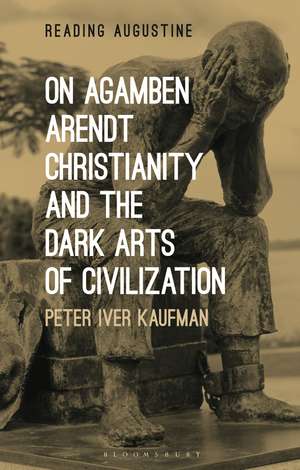On Agamben, Arendt, Christianity, and the Dark Arts of Civilization: Reading Augustine
Autor Dr Peter Iver Kaufmanen Limba Engleză Paperback – 16 oct 2019
| Toate formatele și edițiile | Preț | Express |
|---|---|---|
| Paperback (1) | 150.96 lei 3-5 săpt. | |
| Bloomsbury Publishing – 16 oct 2019 | 150.96 lei 3-5 săpt. | |
| Hardback (1) | 434.45 lei 6-8 săpt. | |
| Bloomsbury Publishing – 16 oct 2019 | 434.45 lei 6-8 săpt. |
Din seria Reading Augustine
- 15%
 Preț: 162.36 lei
Preț: 162.36 lei - 14%
 Preț: 177.05 lei
Preț: 177.05 lei - 8%
 Preț: 157.75 lei
Preț: 157.75 lei - 13%
 Preț: 174.51 lei
Preț: 174.51 lei - 8%
 Preț: 151.38 lei
Preț: 151.38 lei - 8%
 Preț: 151.38 lei
Preț: 151.38 lei - 15%
 Preț: 175.53 lei
Preț: 175.53 lei - 8%
 Preț: 158.64 lei
Preț: 158.64 lei - 19%
 Preț: 169.08 lei
Preț: 169.08 lei - 14%
 Preț: 177.05 lei
Preț: 177.05 lei - 14%
 Preț: 176.44 lei
Preț: 176.44 lei - 15%
 Preț: 168.74 lei
Preț: 168.74 lei - 14%
 Preț: 176.17 lei
Preț: 176.17 lei - 19%
 Preț: 152.28 lei
Preț: 152.28 lei - 14%
 Preț: 171.22 lei
Preț: 171.22 lei - 44%
 Preț: 118.11 lei
Preț: 118.11 lei - 23%
 Preț: 171.85 lei
Preț: 171.85 lei - 13%
 Preț: 174.51 lei
Preț: 174.51 lei - 9%
 Preț: 157.32 lei
Preț: 157.32 lei - 8%
 Preț: 151.38 lei
Preț: 151.38 lei - 14%
 Preț: 170.50 lei
Preț: 170.50 lei - 15%
 Preț: 156.87 lei
Preț: 156.87 lei - 9%
 Preț: 150.50 lei
Preț: 150.50 lei - 15%
 Preț: 157.32 lei
Preț: 157.32 lei - 14%
 Preț: 163.91 lei
Preț: 163.91 lei - 8%
 Preț: 158.20 lei
Preț: 158.20 lei
Preț: 150.96 lei
Preț vechi: 165.01 lei
-9% Nou
Puncte Express: 226
Preț estimativ în valută:
28.89€ • 30.05$ • 23.85£
28.89€ • 30.05$ • 23.85£
Carte disponibilă
Livrare economică 24 martie-07 aprilie
Preluare comenzi: 021 569.72.76
Specificații
ISBN-13: 9780567682758
ISBN-10: 0567682757
Pagini: 168
Dimensiuni: 138 x 216 x 17 mm
Greutate: 0.23 kg
Editura: Bloomsbury Publishing
Colecția Bloomsbury Academic
Seria Reading Augustine
Locul publicării:London, United Kingdom
ISBN-10: 0567682757
Pagini: 168
Dimensiuni: 138 x 216 x 17 mm
Greutate: 0.23 kg
Editura: Bloomsbury Publishing
Colecția Bloomsbury Academic
Seria Reading Augustine
Locul publicării:London, United Kingdom
Caracteristici
Examines the interdisciplinary conversation between the legacy of Augustine and contemporary quest for radical political alternatives
Notă biografică
Peter Iver Kaufman is Professor Emeritus at the University of North Carolina, Chapel Hill, USA, and holds the George Matthews and Virginia Brinkley Modlin Chair in Leadership Studies at the University of Richmond, USA.
Cuprins
AcknowledgmentsPrefaceChapter 1: Augustine and AgambenChapter 2: Glory, Glory: Agamben: The Coming OvercomingChapter 3: Arendt's Augustine: To Augustine and Not to AugustineIndex
Recenzii
Kaufman presents a rich, dense amount of quality content and context. I found new illuminating insights, quotations, and cross-references on most pages.
Peter Kaufman is one of our most venerable interpreters of Augustine's political thought. In this creative volume, he continues his quarrel with Augustine's optimists through a series of illuminating and provocative forays into Agamben and Arendt. Kaufman's communitarian alternative may be the antidote we need for these cynical and lonely times.
In a creative juxtaposition that leverages Augustine's political theology for both modern and postmodern critiques of citizenship and sovereignty, Kaufman has managed to locate in the early Christian monastic movement some paradigms of countercultural identity formation in the figure of the practicing Christian who lives as a pilgrim, exile, and "other." Augustine is here interpreted as a theologian whose early, short-lived fantasy of an alternative community at Cassiacum left an indelible imprint on his imagination, even as he became a central figure in the shaping and definition of what Christian "conformity" should look like. This is a study that will challenge many assumptions of patristic scholars, one that recuperates Augustine as a thinker who can be placed in a critical tradition of resistance and non-conformity.
This volume is a great addition to the series, Reading Augustine edited by Miles Hollingworth ... The genius of this book lies in its invitational style. It forces nothing on Augustine, and does not force Augustine on anyone.
Peter Kaufman is one of our most venerable interpreters of Augustine's political thought. In this creative volume, he continues his quarrel with Augustine's optimists through a series of illuminating and provocative forays into Agamben and Arendt. Kaufman's communitarian alternative may be the antidote we need for these cynical and lonely times.
In a creative juxtaposition that leverages Augustine's political theology for both modern and postmodern critiques of citizenship and sovereignty, Kaufman has managed to locate in the early Christian monastic movement some paradigms of countercultural identity formation in the figure of the practicing Christian who lives as a pilgrim, exile, and "other." Augustine is here interpreted as a theologian whose early, short-lived fantasy of an alternative community at Cassiacum left an indelible imprint on his imagination, even as he became a central figure in the shaping and definition of what Christian "conformity" should look like. This is a study that will challenge many assumptions of patristic scholars, one that recuperates Augustine as a thinker who can be placed in a critical tradition of resistance and non-conformity.
This volume is a great addition to the series, Reading Augustine edited by Miles Hollingworth ... The genius of this book lies in its invitational style. It forces nothing on Augustine, and does not force Augustine on anyone.
